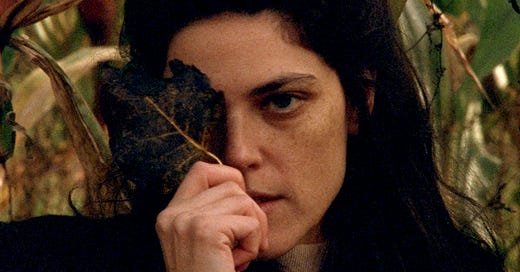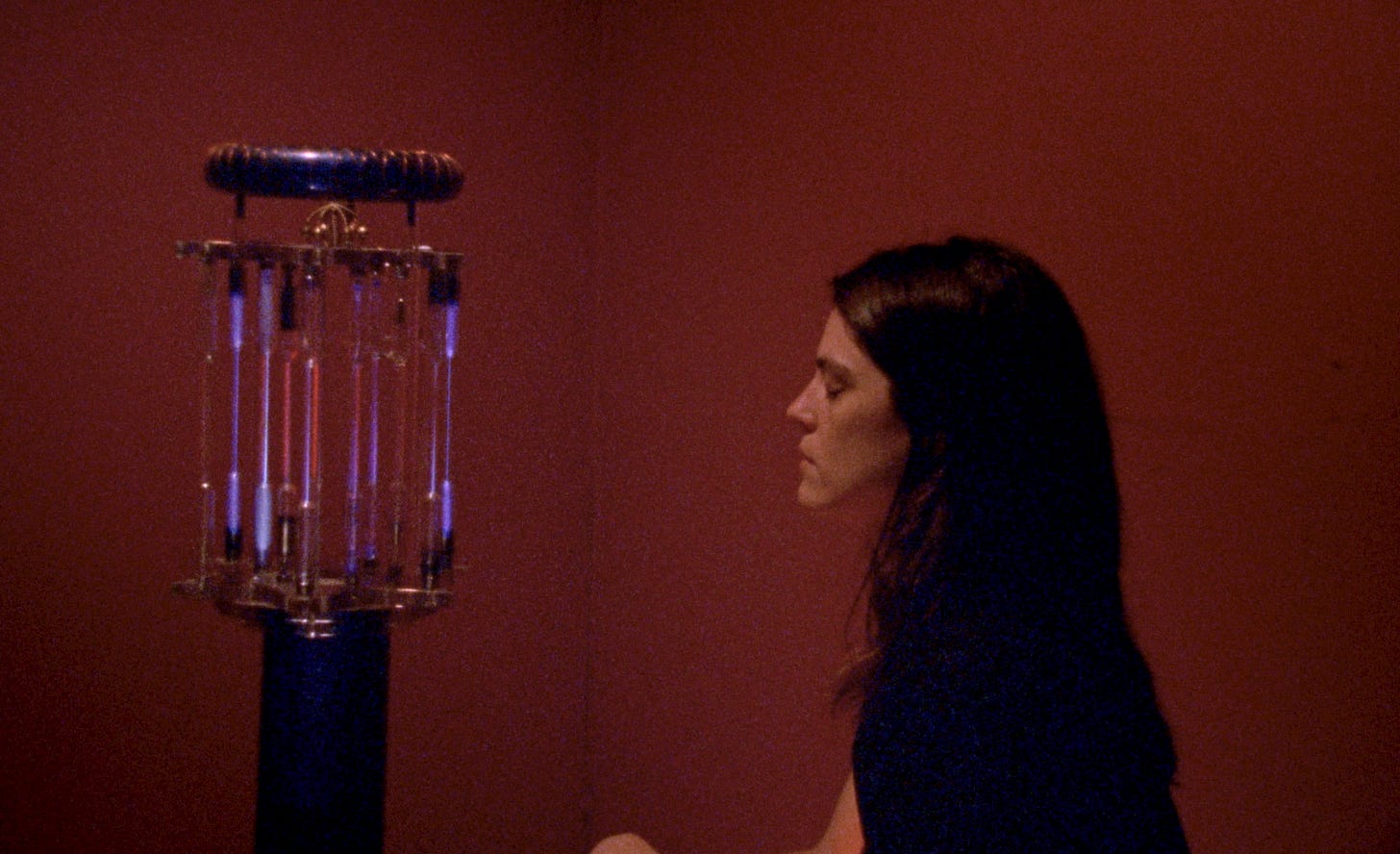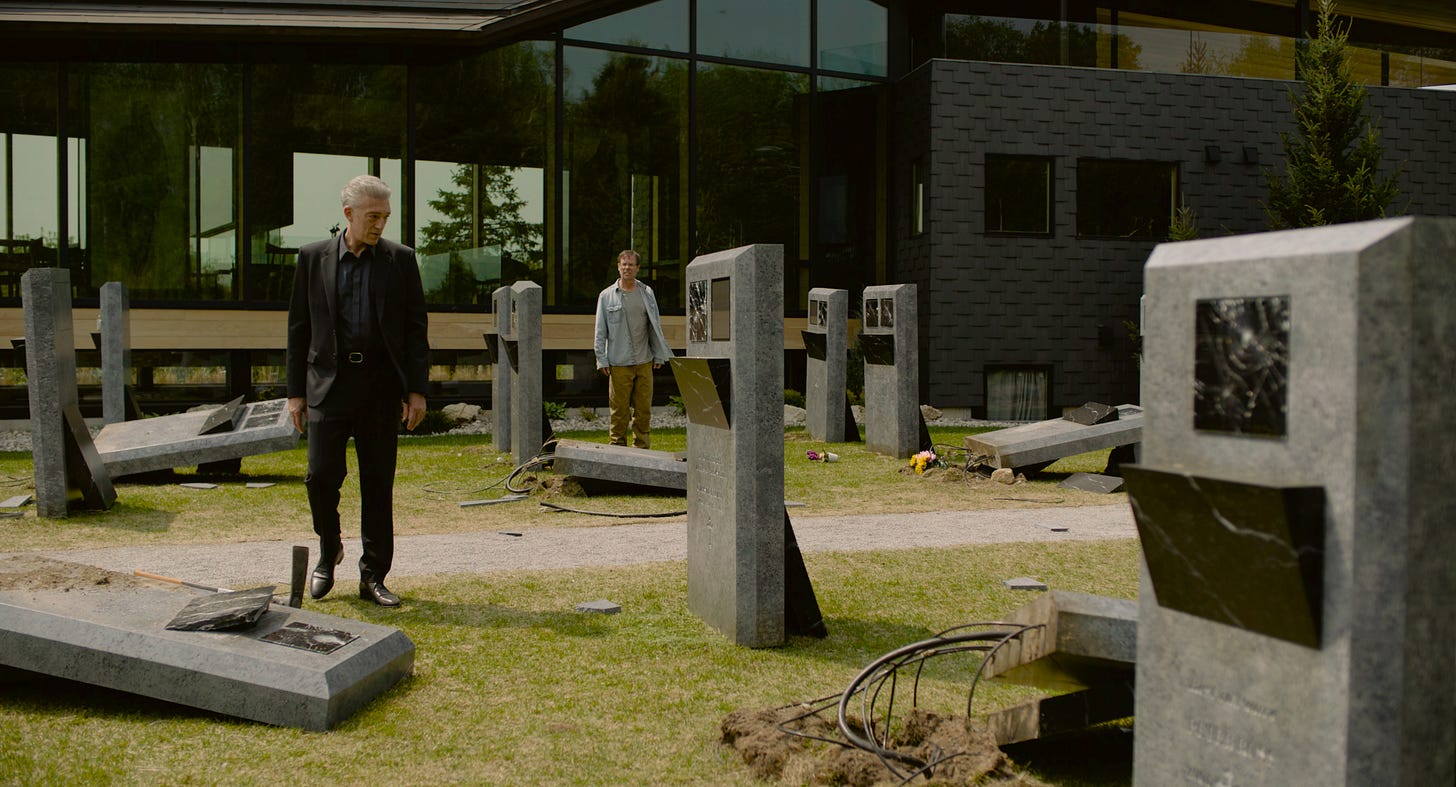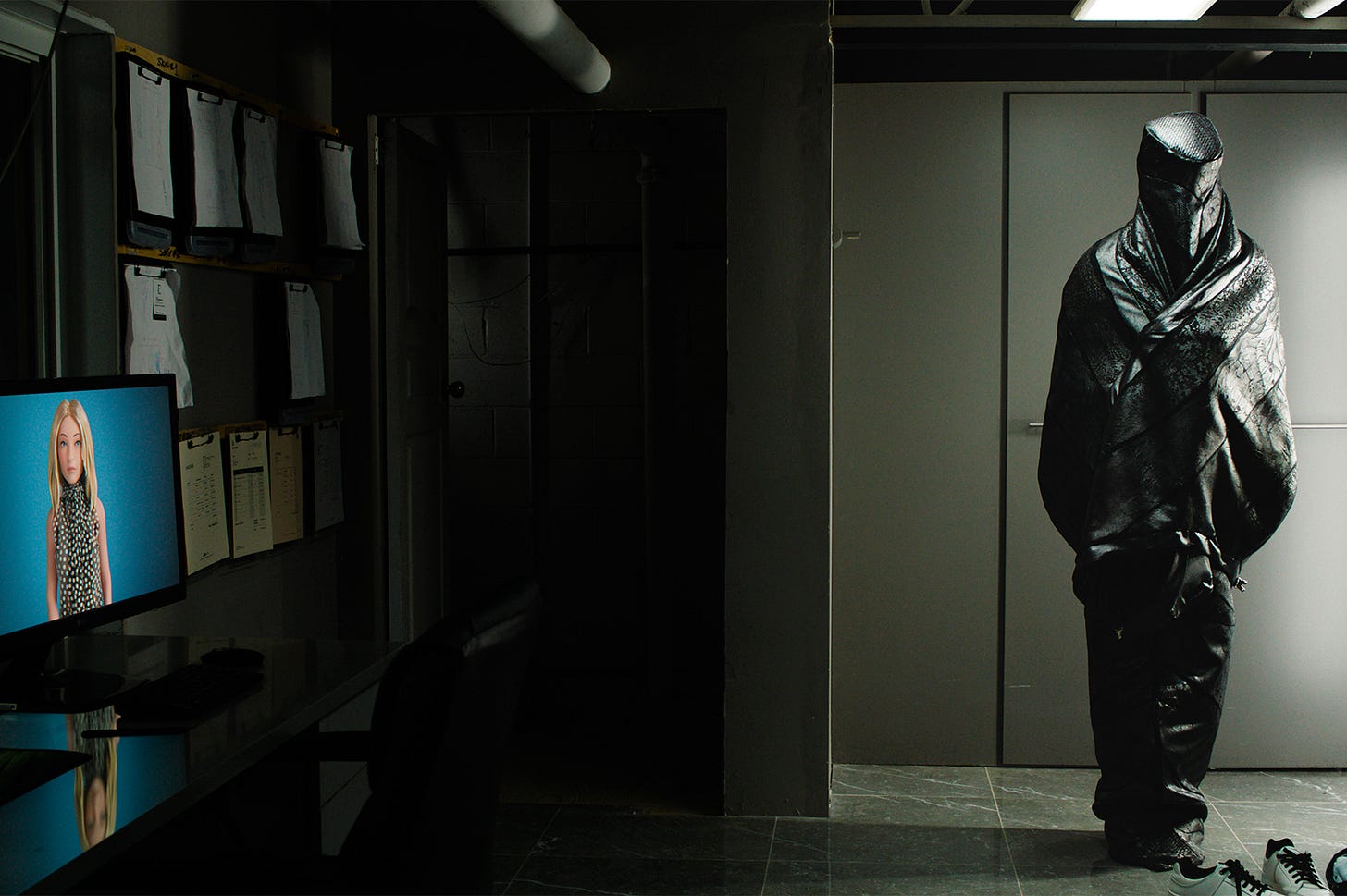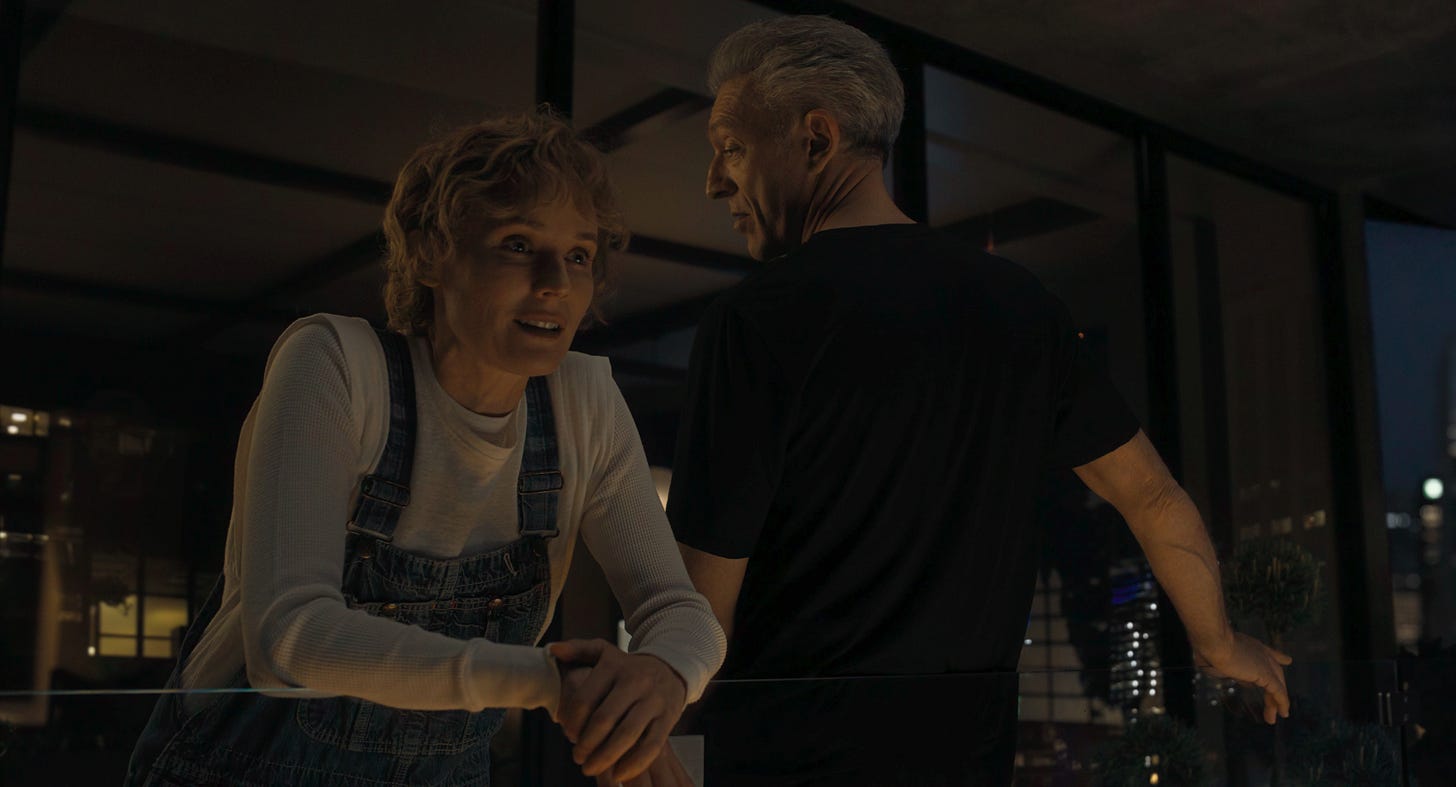Twin Griefs
The filmmakers behind “The Shrouds” and “Invention” submerge real-life mourning into offbeat anti-thrillers.
If you really wanted to sell the two movies reviewed below, you could market them as conspiracy techno-thrillers. That would lead to a lot of disappointed audiences, as it’s more accurate to describe these films as personal explorations of grief amidst the comforts of believing there’s an underpinning logic to the world, even if it is an evil one.
(Ideally this would have been published a week ago, when Invention and The Shrouds began their theatrical campaigns. Life has been busy, which at least has given me some material for my next Kernels column. I feel like I write this disclaimer in literally every other review that I post.)
Invention
Screened April 18-24 at Metrograph in NY. Streaming on Mubi this summer.
In October 2020, in response to ongoing public health measures intended to control the spread of COVID, three professors of medicine published The Great Barrington Declaration. Advocating for mass infection amongst the healthy to bring about herd immunity, they called on governments to end masking requirements, get rid of quarantines, re-open the schools, and basically let ‘er rip. This fringe proposal was swiftly lambasted by the vast majority of health officials; Doctor Fauci dismissed it as “nonsense and very dangerous.” But the letter was anodyne compared to the conspiracy theorists. Some of them viewed the pandemic as a pretext for the state to strip people of their personal freedoms, but those who truly knew ball believed that Bill Gates created the virus and infected people with it using 5G towers. Those renegade academics wouldn’t prefer to be associated with such crackpots, but they all inhabit the same ideological continuum of pandemic dissidents.
The Great Barrington Declaration was named after the place where it was drafted and signed, a small Massachusetts town tucked amidst the Berkshires. Great Barrington is also where Callie Hernandez and Courtney Stephens conceived of their new film Invention, in which its protagonist considers the possibility that a conspiracy surrounds the death of her father, a doctor who advocated for alternative medicine. Hernandez, who co-wrote, produced, and stars, built the film around her own dad, himself a new age doctor who believed in reptilians and the healing properties of electromagnetic frequencies. He died of COVID in 2021, and although this Great Barrington coincidence is probably nothing more than that, it gives this film a real-life parallel in its consideration of why conspiracy theories are comforting to its believers. It feels nice to believe there is a secret logic underpinning a chaotic, uncertain world, even if it’s conjured purely from noise. It’s a curdled form of faith.
When we meet Carrie Fernandez (either a very or barely fictionalized version of actor/co-writer/producer Callie Hernandez), she’s sitting in a funeral home, going over the choices and expenses that come with handling the newly departed. She opts for the cheapest “urn” for her father’s ashes, a black plastic box provided by the crematory. Without having to say it outright, we understand that Carrie did not enjoy the closest relationship with her dad. Because of his outstanding debts, Carrie’s only real inheritance will be a patent for one of his inventions, an “electromagnetic healing device.” If it works, the patent is worth billions. But it’s currently worthless, as the initial set of machines were recalled by the FDA. Invention unfolds over a series of conversations between Carrie and the people who knew her father better: his investors and adherents, some of whom speak of her father with a reverence unfamiliar to her. One of these interlocutors suggests that the doctor’s work was purposefully suppressed, sending Carrie on a quest to learn more about this mysterious machine, and perhaps better understand its inventor.
Lest I mislead you, this is not at all a typical conspiracy thriller; Invention has practically no moments of suspense. It follows in the tradition of mumblecore, a strain of lo-fi, improv-heavy filmmaking that originated in the mid-aughts. (Some of its practitioners act in this film, including Joe Swanberg and James N. Kienitz Wilkins.) Mumblecore movies have a very DIY feel, but this film’s director, Courtney Stephens, goes further than most in blurring the lines between fiction and fact. We see archival footage of the real Doctor Hernandez’s television appearances from the 1990s. Sometimes, at the end of a scene, we hear Stephens call “cut” and once the camera is turned off, we continue to listen in on the ensuing conversations between cast and crew. Whether we’re watching Carrie, Callie, or some combination of character and actor, it doesn’t matter too much. We are seeing a woman adrift, her distractions only delaying the outpouring of grief for a father whose life she is just beginning to comprehend.
The Shrouds
Opened April 18 in NY & LA, expanding nationwide beginning April 25. This review is expanding on previously published NYFF coverage.
David Cronenberg’s new film is not as overtly metafictional as Invention, but they share a basic premise (protagonists stumbling into a potential conspiracy involving medical technology) and draw inspiration from their creator’s personal grief (Cronenberg’s wife passed away a few years ago). Grotesque body transformations are sort of this director’s whole deal—images from The Fly will forever remain seared in my mind—but The Shrouds has a particular focus on what happens to our corporeal forms after death (the ultimate metamorphosis) and on how desperately the living cling to the departed.
And something literally clings to the dead: that titular shroud. When wrapped around a corpse, the embedded 3D imaging technology allows viewers to see the body decompose in real time. (The Rick Owens-coded shroud, a black leatherine wrap, was designed by Anthony Vaccarello, Saint Laurent’s creative director and a producer on this film.) Those who wrap their own dead loved ones in one of these spectral cloaks can travel to the cemetery to look at the renderings by using a tablet affixed to the gravestone. But if, for example, one wanted to check in on their dead mother while summering in Bretagne, there’s an app for that. (Privacy is important, of course: we’re informed that all of the data is “encrypted, pun intended.”)
The entrepreneur behind this macabre invention is a widower named Karsh (Vincent Cassel), who created the shrouds while mourning his wife (Diane Kruger), who had died of a degenerative bone disorder that we see progress in gut-churning detail. (Kruger also appears as her twin sister, with whom Karsh strikes up an unusual relationship.) In the near-future of The Shrouds, this technology is still novel, but it already has vehement detractors who view it as a desecration of the deceased. One night, an unknown vandal tears up the graveyard where Karsh’s wife is buried; he suspects that nefarious schemes are at play.
The Shrouds is far too subdued to play out like a conventional conspiracy thriller. (The same can be said of the aforementioned Invention.) Rather, this film is a moodily tender meditation on grief with a healthy mix of gory body horror, as only David Cronenberg could do. It is also, like the best science fiction, a treatise on The Way We Live Now, particularly in considering how the encroachment of cyberspace into our lives has turned us into mistrustful, paranoid loners. If death is humanity’s final frontier, the shroud is the tech industry’s final disruption. Perhaps we should be wrapping it around our (living) selves, but we may not like what we see inside.
Keeping in tune with Cronenberg's prior film, Crimes of the Future, everyone speaks and behaves a step lower than normal. They all act like disaffected cyborgs, which strangely makes the film more compelling. Cassel, a French actor, speaks his English with an accent that is frankly very weird, but it fits in with Cronenberg’s stilted dialogue. The actor who makes the most of the script’s oddities is Guy Pearce, who plays Maury, a neckbeard hacker assisting Karsh’s investigation (and the obsessed ex-wife of that twin sister). It’s the complete opposite of his character from The Brutalist, the mannered, cold-blooded Harrison Van Buren. He snagged a much-deserved Oscar nomination for that film, but I dare say that Pearce’s hot-headed performance in The Shrouds is even better. Some of the conversations between Karsh and Maury are essentially dramatizations of a normal person trying to argue with conspiracy theorists on Twitter or Reddit. During one such scene, I wrote in my notebook “I love this movie it’s so weird.” The film never truly takes flight, unfortunately deflated by a disappointing denouement. But that note I took still holds; I would love to be enshrouded in Cronenberg’s wild world.


